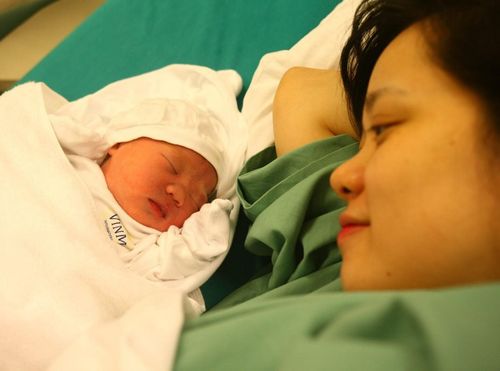This is an automatically translated article.
The article was professionally consulted with Doctor Pham Thi Mai Nhung - Obstetrician and Gynecologist - Department of Obstetrics and Gynecology - Vinmec International Hospital Da Nang.The perineum is the anatomical area between the urethra, the tube that carries urine from the bladder and anus, in women, the perineum also has its own opening. During childbirth, some women will need an episiotomy to make it easier for the baby to pass through the vagina. However, this also causes the mother to have pain in the perineal area after giving birth and needs some measures to help relieve the pain.
1. Why do I have pain in my perineum after giving birth?
Vaginal birth puts a lot of pressure on the perineum (the skin and muscles between your vagina and anus), which must stretch to be large enough for the baby's head to pass through.If you had a vaginal delivery without an perineal tear, your perineum may only be swollen or painful afterward, then you'll likely feel fine within a week or even a week or two day.
But your perineum may tear during childbirth or the doctor will need to make an episiotomy to open up more passage for the baby's head. These wounds can be quite painful during the healing process.
2. How long does it take to heal?
Healing time varies, but generally speaking, the deeper the cut or incision, the longer it will take to heal. A minor tear, or first-degree tear, involves only the skin (not the muscle), and stitches may not even be needed. These cuts generally heal quickly with some discomfort.
Thời gian lành vết thương phụ thuộc vào tình trạng của vết thương và cơ địa
If you have a third or fourth degree tear, which is a more serious tear that extends to the rectum, you may have pain and discomfort for a month or even longer. (These tears can happen to anyone but are more likely if you have an episiotomy.) For the first few days after giving birth, you may have trouble urinating and having a bowel movement. You're also more likely to have problems with gas control or bowel movements for months or even years after giving birth.
3. What can I do to ease the pain and help it heal faster?
Here are a few ways you can help your intimate area heal and heal faster, but to be sure which is right for you, consult your doctor or midwife. before you give birth:Apply an ice pack with a soft coating to the perineal area right after you give birth to reduce swelling and discomfort. You should replace a new ice pack every few hours for 12 hours or so. Take ibuprofen or acetaminophen for pain relief. (Aspirin should not be taken if you are breastfeeding.) If you have a lot of tearing, you may need a prescription pain reliever. Consider trying a numbing spray. Change tampons after you go to the bathroom or shower. Use a squirt bottle to pour warm water into the perineum while you pee. The water will dilute your urine so it doesn't come into contact with your skin or wound as much. Then, clean the area with another bottle of water.

Bạn có thể sử dụng các loại thuốc giảm đau theo tư vấn của bác sĩ
4. When should I visit a Medical facility or contact a doctor?
Call your doctor if you have vaginal pain or swelling that won't go away or gets worse, or even if you don't feel comfortable. You may be referred to a urologist or physical therapist to help you with pelvic rehabilitation.
Nên tới gặp bác sĩ để được khám và điều trị kịp thời khi thấy đau, sưng vùng kín
5. When can I have sex again?
If you don't need an episiotomy and you enjoy sex, you can try sex after a few weeks, when vaginal discharge has stopped.If you have had an episiotomy or have had a tear, you should be fully healed four to six weeks after giving birth. If your doctor has re-examined you and your perineum is stable, you can try having sex afterwards.
If you have a third or fourth degree tear, it is especially important to wait until after your doctor has examined your perineum.
When you first have sex again, you may feel a little tight in your intimate area. To make sex more comfortable, try to relax as much as possible, spend plenty of time foreplay, and use a water-soluble lubricant.
These precautions can be especially helpful if you're breastfeeding because lactation lowers estrogen levels, leading to vaginal dryness. Therefore, you should continue to use lubricant during sex until you stop breastfeeding. Your doctor may recommend using an estrogen vaginal product (prescription only).
If you try the above methods and still find it uncomfortable, wait a little longer. If the pain continues for a few months after you give birth, you may need treatment now.
Remember that it is normal to have little or no sex drive for a while after giving birth. Tell this to your partner and rest assured, your libido will return.

Giảm ham muốn là tình trạng phổ biến ở phụ nữ sau khi sinh
Methods to relieve pain during childbirth, limit pain and relieve psychological pressure during labor. The way to push and breathe during childbirth is usually the right way so that the labor takes place quickly, the pregnant woman does not lose strength during childbirth. How to control postpartum uterine contractions in the shortest time. How to take care of the perineal suture does not cause infection and dangerous complications. Early postpartum re-examination to detect dangerous abnormalities such as residual placenta, missing gauze. Take care of the newborn until full month healthy. To ease the pain of childbirth, Vinmec offers a full Maternity program with a complete "painless delivery" service during and after birth using non-morphine epidural and sedation techniques. ashamed. During the birth process, the mother will be guided by the midwives on how to push and breathe properly, the baby will be born in just 10-15 minutes. After birth, the baby will be cared for in a sterile room before being returned to the mother.
Pregnant women will rest in a high-class hospital room, designed according to international hotel standards, 1 mother 1 room with full facilities and modern equipment. Mothers will be consulted by nutritionists on how to feed the baby before being discharged from the hospital. Postpartum follow-up with both mother and baby with leading Obstetricians and Paediatricians.
If you have a need for medical examination at Vimec Health System nationwide, please make an appointment on the website to be served.
Please dial HOTLINE for more information or register for an appointment HERE. Download MyVinmec app to make appointments faster and to manage your bookings easily.
Reference source: babycenter.com









